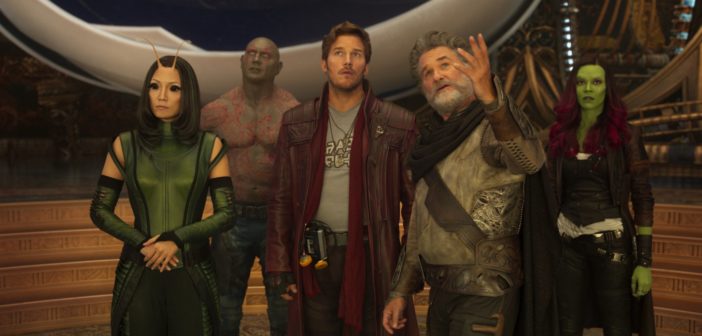“Guardians of the Galaxy Vol. 2” highlights one the more intrinsic problems with the Marvel Studios’ model. Neither an origin story nor a climax, it has to be a complete, compelling adventure as well as another cog, propelling the larger Marvel Cinematic Universe forward. “Guardians Vol. 2,” however, disappoints in both regards.
We still follow our band of misfit heroes, Star-Lord (Chris Pratt), Gamora (Zoey Saldana), Drax (Dave Bautista), Rocket Raccoon (Bradley Cooper) and the newly Baby Groot (Vin Diesel). The lighter tone and wit that helped define the first movie still exists here, but instead of the humor organically unfolding as a result of the absurdities that are bound to arise in a superhero space adventure, this time around they swerve right into the cheap gags.
The punchlines feel produced and plotted which, when the movie reaches for emotion beats at the end, robs it of some impact. The biggest victims this affects are Drax and Rocket Raccoon, whom both feel bereft of real emotion until the script calls for it.
We begin our adventure with the gang escaping from the Sovereigns, a race of homogeneous gold aliens, led by the mysterious Ayesha, whom Rocket stole a few Anulux Batteries from. The Guardians are about to be shot down, but are inexplicably saved from the horde of Sovereign ships and are forced to crash land on a nearby planet. Once on the surface, they meet the man who rescued them from the oncoming warships, the godlike Ego (Kurt Russell), who claims that he is Star-Lord’s long-lost father and convinces Star-Lord, Drax and Gamora to come with him to his planet.
The Sovereign then hires Yondu (Michael Rooker) and his Ravagers to hunt down the remaining Guardians left with their ship. The group arrives on Ego’s planet, where he derives his power, where he hopes to be the father that he never was for Star-Lord. It quickly becomes obvious that things aren’t what they seem and that Ego has ulterior motives, besides playing catch with his son with conjured energy balls.
Ego is an interesting enough “villain,” in fact, Kurt Russell gives one of the best performances of the film and is one of the biggest bright spots. It was good to see the “Who is Star-Lord’s father?” plot wrapped up, but it hardly warrants a nearly two and a half hour picture. Things also get more complicated with the father-son dynamic between Star-Lord and Yondu by the end of the movie, but as much as I enjoy Yondu and what they were doing, it doesn’t redeem the first hour and a half.
Ultimately, “Guardians of the Galaxy Vol. 2’s” biggest sin is that the characters, and universe as a whole, are in the same spot emotionally as they were at the beginning. In short, it doesn’t accomplish much. Star-Lord met his father, yes, but he still thinks that he is a piece of garbage, as he assumed before. Rocket embraces his role as a reluctant hero despite himself, just as he did in the first movie. Baby Groot is there for some chuckles and fun enough gags. Drax is more jokey, which can be hit or miss at best and doesn’t seem like the Drax we came to know before.
The only Guardian who you could argue develops is Gamora and her relationship with her sister Nebula, with their mutual disdain for their father Thanos. With Thanos set to be the big bad of Avengers: Infinity War, the sisters not getting the screen time they deserve is a glaring missed opportunity.
“Guardians of the Galaxy” was one of the most unique films in Marvel’s library, and director James Gunn was charged with the arduous duty of capturing what made the original so enticing. Its vivid, saturated visuals and brash heroes were a breath of fresh air to the hyper-serious world that had been built up to that point. If you like flashy colors and ’70s pop soundtracks, you will surely enjoy that vibe here, but most of the substance around the stylish aesthetic rings a bit hollow.
That’s not to say that it’s all bad, there are some enjoyable moments in the film. However, the narrative never feels enough to carry the film. The film struggles to further develop the Guardians, and also doesn’t move the overarching plot of the Marvel Cinematic Universe along in much of any way. Hilariously, the biggest contribution the movie has to the larger universe occurs after the credits roll.
Two and a half out of five stars. The ninth best out of 15 Marvel movies.

